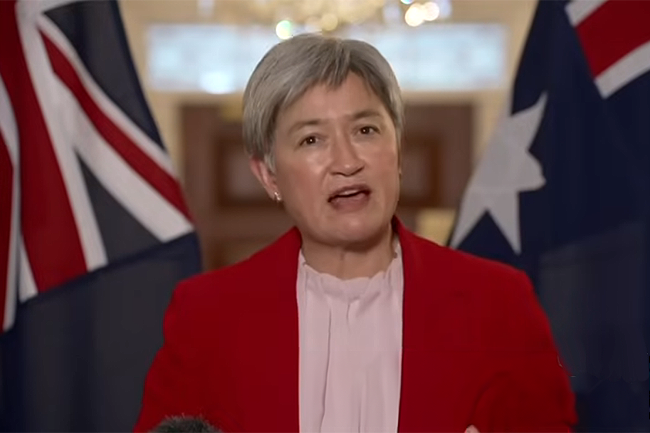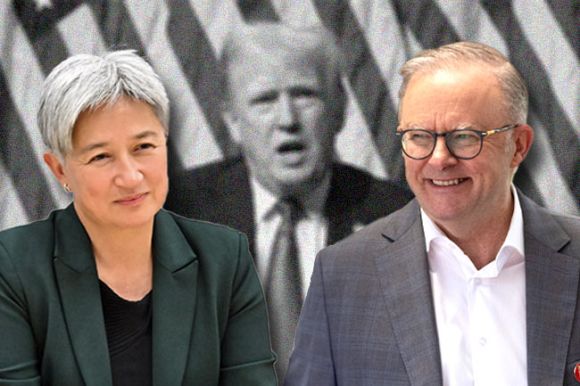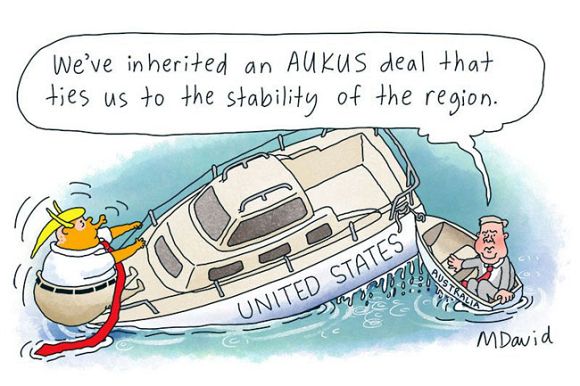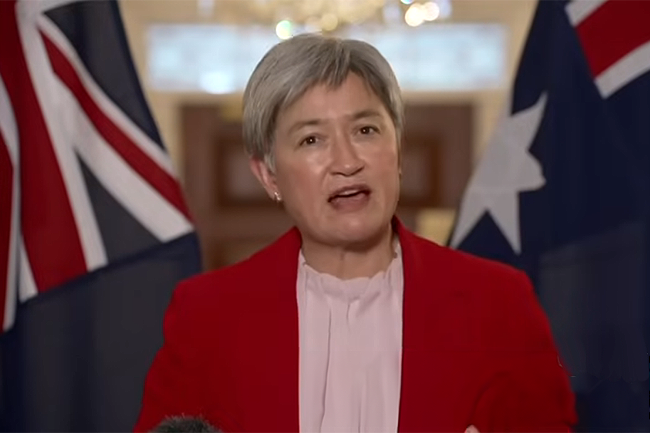Penny Wong’s cautious diplomacy reveals Australia’s struggle to balance loyalty to the U.S. with the need for genuine independence on the world stage, writes Mark Beeson.
IT CAN’T BE EASY being Australia’s foreign minister. Even the clever ones, of which there have been a few, must find it difficult to square circles and maintain a consistent line in the face of changing geopolitical conditions and the often catastrophically ill-judged policies of the United States, our presumed protector.
Perhaps Penny Wong will follow the lead of some of her more thoughtful predecessors and rediscover her independence and integrity when she is free of the strictures of party solidarity. In the meantime, she will have to choose her words carefully, something she’s very good at.
A recent, largely unnoticed speech to the Australian Institute of International Affairs is a good example of the genre. On the plus side, there are some welcome, if boilerplate-ish, nods in the direction of regionalism and the continuing importance of multilateralism. To be fair, Senator Wong has been tireless in meeting her counterparts in the Indo-Pacific region. Good for her. Jaw-jaw really is better than war-war, as our Southeast Asian neighbours remind us.
Australia’s record is less impressive. On the contrary, there haven’t been many wars, no matter how far away or strategically tangential, that Australian policymakers haven’t rushed to take part in, even without being asked. As a newly independent and nervous outpost of British colonialism, perhaps the folly of World War 1 can be understood if not forgiven. But Vietnam, Iraq, Afghanistan? “We” even bombed Syria.
Perhaps it’s just hard to resist the temptation to use all that expensively acquired military hardware once you’ve got it. That doesn’t bode well for the much-maligned AUKUS project, of course, but given that the nuclear-powered – not nuclear-armed – submarines are never likely to arrive, perhaps it doesn’t matter. We’re building a base for American and British subs and paying for the refurbishment of their shipyards, after all, so we’re sure to be safe, despite being a nuclear target.
These awkward realities are glossed over or ignored in Senator Wong’s recent speech, which suggests that the U.S. remains our “closest ally” and that “the Indo-Pacific would not have enjoyed long periods of stability and prosperity without the United States and its security guarantee to the region”.
This may come as news to the 2 million or so Vietnamese who died in the “American War”, but who’s counting? There are some great investment opportunities in Vietnam now, after all, which wouldn’t have happened if the communists had won. Oh, hang on, better fact-check that.
An even more unfortunate reality for what Senator Wong calls “amplified middle power diplomacy” is that our principled positions are being systematically trashed by our increasingly erratic, unpredictable and undemocratic “great and powerful friend”.
As Wong rightly points out:
“Russia’s full-scale invasion of Ukraine demonstrates what is at stake in standing up to aggressors — an assault on sovereignty that we cannot allow to set a successful precedent.”
Even if we gloss over America’s fondness for unilateral wars of aggression when deemed to be in its strategic interest, the leader of what used to be called the free world is trying to negotiate a war-ending deal that rewards the aggressor and punishes the victim. If ever there was a moment for a bit of “amplified middle power diplomacy”, this ought to be it. Don’t hold your breath.
The reality is that, despite endless talk about the potential of creative middle power diplomacy, we lack the fundamental prerequisites: independence of thought and action. Not only are we home to a growing array of American military assets that lock us into whatever harebrained policy emerges from the White House, but Australian policymakers and their advisors are simply incapable of thinking the unthinkable and becoming a genuinely sovereign nation.
Consequently, no Australian government can even have a frank discussion with the population it claims to represent about the implications of our foreign policy, our relationship with the United States, or our hypocritical attitude to our “Pacific family”, who are destined to disappear beneath the waves because of our continuing expansion of fossil fuel projects. As Senator Wong points out, “being a part of the solution on climate change is also central to our credibility in the Pacific”. I was wondering where it went.
Meanwhile, “China will continue trying to reshape the region according to its own interests”. Yes, there’s always a looming threat that justifies all the improbable, compromised and unjustifiable actions we take to prop up America’s ebbing hegemony, whatever form it takes. The unspeakable reality is that our political leaders seem to hope they can wait out the Trump Administration and geopolitical business as usual will return.
Even if Trump doesn’t have a third term, we – in this case, the human race – will have to deal with a growing tide of authoritarianism, unaddressed climate change, entrenched spheres of influence and the very real possibility that the U.S. will no longer be a democracy, or not one worthy of the name, at least. Still, maybe Vice President JD Vance and Secretary of Defence Pete Hegseth will sort things out. What could possibly go wrong?
But if even mentioning Trump in an uplifting after-dinner speech proved difficult, saying something about his possible successors might really have darkened the mood. Why spoil a nice evening when we can’t do anything anyway? Time for another glass of wine.
Mark Beeson is an adjunct professor at the University of Technology Sydney and Griffith University. He was previously Professor of International Politics at the University of Western Australia.
 This work is licensed under a Creative Commons Attribution-NonCommercial-NoDerivs 3.0 Australia License
This work is licensed under a Creative Commons Attribution-NonCommercial-NoDerivs 3.0 Australia License
Support independent journalism Subscribe to IA.














